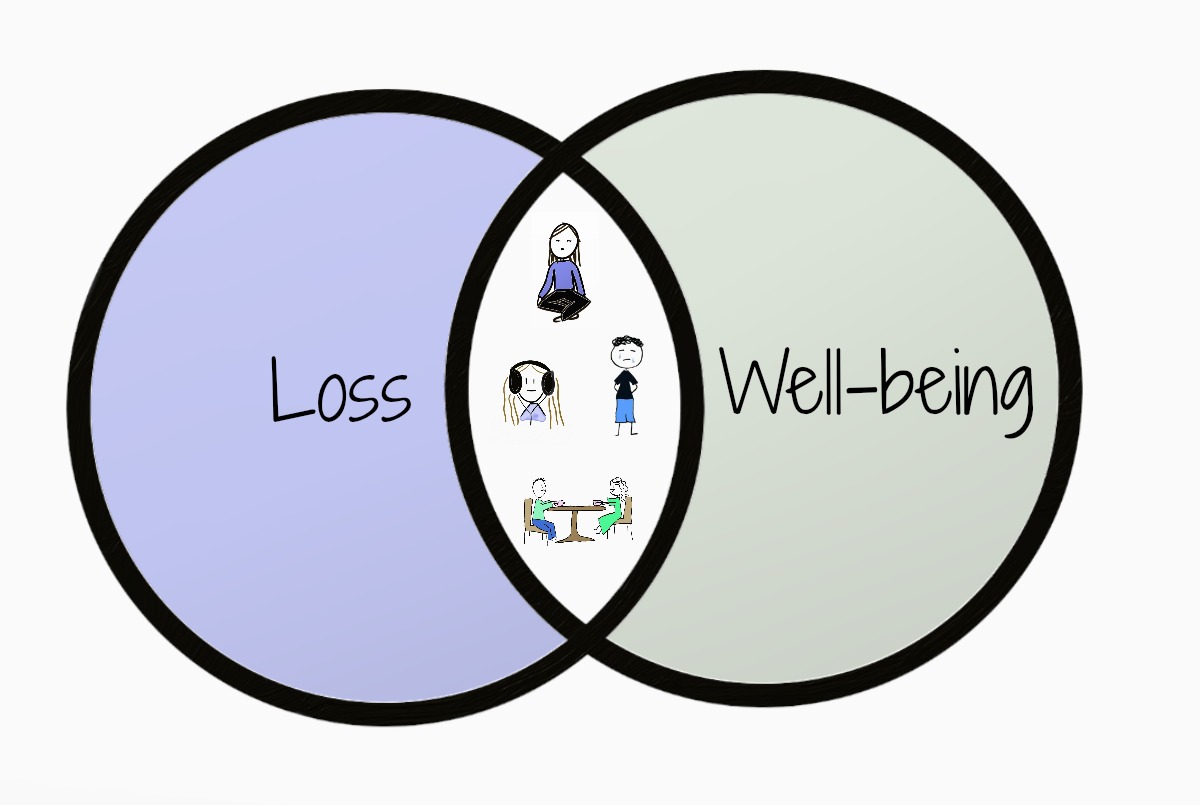A Balanced Approach to Coping With Life After Loss
/ Coping with Grief : Eleanor Haley
When coping with grief, it's logical to prioritize managing the distressing thoughts and emotions that have become a part of your life since your loved one's death. This makes sense for a number of reasons, chief among them the fact that painful grief emotions stink.
The need to focus specifically on the loss and manage corresponding emotions is echoed in many of the most popular grief theories. Especially those that formed around the "grief work hypothesis", which says that in order to come to terms with loss, one has to engage in ongoing efforts to confront the death of their loved one. You may recognize these theories by their "stages", "tasks", and "phases". This is obviously an oversimplified explanation, but for those who are interested, we have an entire section on grief theory.
Anyway, I'm not here to refute existing grief models or the need to confront the loss and cope with difficult emotion. I absolutely know these things are a crucial part of coping with grief. However, when conceptualizing coping with grief, I like to take a step back and look at the bigger picture of what it means to cope with life after loss.
Since we're already talking about grief theory, I'd like to mention one more grief model: The Dual Process Model of Coping with Bereavement (DPM). This model was put forth in 1999 by theorists Stroebe and Schut in response to perceived shortcomings in the prevailing grief work hypothesis models.
Briefly, the DPM describes the ways people cope with the loss of a close person. Coping, according to the DPM, happens in the context of everyday life and focuses on loss- and restoration-oriented stressors. Here's how it breaks down:
- Loss-Orientated Stressors refer to the processing of the loss itself. This may involve yearning and rumination about the deceased, memories of the past, thoughts about the death, etc. A person copes with loss-orientated stressors on-and-off in an ongoing way over time.
- Restoration-Orientated Stressors refer to the attention one must give to adjusting to changes and secondary losses. These might include taking on new roles, dealing with finances, and adjusting one's identity to accommodate a new reality (Stroebe & Schut, 1999).
- Oscillation: An important part of the DPM is "oscillation," which refers to shifting back and forth between loss-oriented and restoration-oriented stressors AND occasional "confrontation-avoidance". Under this model, a useful and adaptive part of grief is taking a break and seeking respite from grief, as long as the avoidance isn't extreme or persistent.
So now that you have a very basic understanding of the DPM, here's what we like about it as it relates to coping with life after a loss:
- It acknowledges that grief is an ongoing process that one has to learn to live with. There isn't an ultimate resolution, an endpoint, or a return to 'normal'. Grief requires coping and adjusting on a day-to-day basis.
- It acknowledges the impact of secondary losses and secondary stressors, as well as the reality that a grieving person must spend almost as much time coping with these stressors as they do coping with the actual loss.
- It acknowledges that taking a break from grief and occasional grief suppression/avoidance can be adaptive and useful for grieving people. (If you want to know the difference between occasional avoidance and chronic, maladaptive avoidance, read this article).
WYG Conceptualization of Coping
While many people think coping with life after loss is only about confronting and coping with difficult grief emotions, we believe that coping encapsulates anything that helps you feel better and gives you a boost of positive emotion. Following what we've learned from the DPM, it's important to find ways to cope with the thoughts, experiences, and emotions directly related to the loss. However, it's also equally important to engage in coping that promotes adjustment and overall well-being ('taking a break' type coping).
We conceptualize coping as big things like seeing a therapist or small things like making time to play with your kids, walking your dog, or to reading for a half an hour. Our rationale is that, the better you feel, the more strength you'll have for dealing with grief. Even though you may not immediately realize it, there is a lot of overlap between well-being coping and loss-related coping. The coping that you use to deal with loss will ultimately increase your sense of well-being, while much of the coping that you use to simply feel better will also help you cope with a loss.
What Do You Mean By 'Well-Being Coping'?
We are going to define well-being coping using the framework of positive psychology's well-being theory, outlined in the book Flourish by Martin Seligman. It is a detailed theory that we're going to distill down for the purposes of this discussion.
Well-being is both the subjective experience of feeling good and also the very real experience of experiencing meaning in your life, healthy relationships, and a sense of personal accomplishment. Basically, well-being theory says that there are five elements that work together to contribute to personal well-being:
(1) Positive Emotions: Even though you may feel far from having a positive view of life, there are things you can do to generally increase positive emotion. For example, you can:
- Assess whether your current outlook is excessively negative.
- Give yourself permission to feel positive emotion.
- Ask yourself: What types of things do I enjoy? What makes me laugh? What makes me feel hope and optimism? What creative outlets do I enjoy? What makes me feel intellectually stimulated?
- Do more of these things.
(2) Engagement: Engagement is concerned with activities that allow you to experience a sense of "flow". If you aren't familiar with "flow", the below video explains it well.
Engagement encapsulates activities that fully absorb you in the present moment, grabbing your whole focus, and creating the sense that time is flying by. What a person considers engaging depends on the individual and can include things like sports, music, cooking, photography, woodworking, reading, crossword puzzles... you name it. Whatever activities feel most engaging to you, do more of them!
(3) Relationships: People are social animals and, regardless of whether you identify as an introvert or extrovert, you need social connection. Identify your support system and nurture these relationships. If you find that your social support is lacking, reach out and get connected with those in your community.
(4) Meaning: Meaning speaks to a person's purpose in life. Unfortunately, this is one area that is particularly impacted by grief and loss. That said, this area may become redefined as you cope directly with your grief-related emotions and experiences. Coping that may be helpful in enhancing a sense of meaning and/or guiding the search for meaning include:
- Journaling
- Reading
- Connecting with your faith
- Gratitude journaling
- Talking through things with a counselor, friend, or support group
- Volunteering (perhaps with a cause your loved one supported)
- Advocacy (perhaps related to your loved one's death)
(5) Accomplishments: Accomplishments refer to personal achievements that give you a sense of satisfaction and pride. These don't necessarily have to coincide with outward accolades, awards, or titles, although they can. Something can be considered an accomplishment if it simply gives you a feeling of gratification knowing you succeeded, survived, or finished. Your accomplishments and what you would like to accomplish is very specific to you. However, as we discussed earlier this week, I hope that you will view the progress you've made in grief as an accomplishment.
Subscribe.
We wrote a book!
After writing online articles for What’s Your Grief
for over a decade, we finally wrote a tangible,
real-life book!
What’s Your Grief? Lists to Help you Through Any Loss is for people experiencing any type of loss. This book discusses some of the most common grief experiences and breaks down psychological concepts to help you understand your thoughts and emotions. It also shares useful coping tools, and helps the reader reflect on their unique relationship with grief and loss.
You can find What’s Your Grief? Lists to Help you Through Any Loss wherever you buy books:






BW February 23, 2021 at 2:30 pm
One of the best articles I have read. It has been 4 years and I still cry in pain sometimes. But it is different, not better. I have done all the things mentioned in the article and they have all helped immensely. Even just looking forward to a gourmet coffee in the morning helps. I was blessed to find a wonderful support group that I attended for 18 months. It saved me and we talked about this topic.
Stephen Duncan December 9, 2020 at 9:17 pm
I was in high school when i lost my grandfather to suicide. It was a big shock When i lost him because he was the world to me. It was hard to go through it because he was someone i could have fun with and look up to. I’m 24 and i’m in job corps. I’ve finally come to grasp the reality of all of it and to get through it one way or another. After joining a group and getting the information to help is a good thing and it will get me through it. Thank you for your time.
IsabelleS December 11, 2020 at 10:14 am
Stephen, I’m so sorry for your loss. It’s so normal and okay not to fully process a death until years later. I’m glad to hear that you’re getting the support you need now. Best of luck!
Stephen D. December 18, 2020 at 10:08 pm
Thank you isabell!
katie yuman December 14, 2020 at 1:00 am
sometime I still can’t believe my Tia is gone it’s when I sated to cry out of nowhere where
I know that she passed away. My friend told me that grief really don’t have a time I can take my time with it. I felt so down at first I still do I just feel a little better know she okay now that she is in a better place.it will get better and you will see better days know you may not know it.
katie yuman December 14, 2020 at 1:02 am
*when
IsabelleS December 14, 2020 at 11:08 am
Katie, I’m so very sorry for your loss. Your friend is right–There is no timeline for grief… You can spend as long as you need grieving. I’m glad to hear you’re feeling a bit better, but don’t judge yourself if you still have bad days. All the best to you!
Anne Jarman March 8, 2019 at 8:44 am
I lost my wife of 18 years to Cancer and it took me 3 years in a grief group and 6 Christmases to finally know this Christmas that she was safe and happy in my heart. Find a grief group possibly with a Hospice or a church or hospital, one where you feel safe and sharing and faithfully attend each week. I am a Lesbian and the concept of having a wife was/is foreign to many people.
I am 85, have an ex-husband, 3 adult children and 6 grandchildren. I didn’t find the support I needed to grieve close to home so I looked for support from Professionals until I had a group of people who wouldn’t judge me. It takes as long as it takes. God bless you, there are people out there who can listen and you can listen to. It is worth the search.
katie yuman December 13, 2020 at 10:15 pm
I hope that you are doing good and that you are better then when you lost your wife it most have felt horrible to loss someone who is really close to you I hope you are well and doing good.
K April 18, 2018 at 11:03 pm
After losing my husband suddenly 8 years ago, a forced job change and stressors upon returning to work, and losing my mother a year ago, finding these links is like coming home and validation that what I continue to struggle with is OK. Cummulative grief and loss is something that I learned about and found helpful. You are not alone. Others do understand.
K April 18, 2018 at 11:03 pm
After losing my husband suddenly 8 years ago, a forced job change and stressors upon returning to work, and losing my mother a year ago, finding these links is like coming home and validation that what I continue to struggle with is OK. Cummulative grief and loss is something that I learned about and found helpful. You are not alone. Others do understand.
Hilary Barker January 30, 2018 at 5:22 pm
Excellent, I am 14 months along after a devastating bereavement, and still grieving fiercely. Wish I had found these links before now. There’s lots of help to be had from reading wyg and it “rings true” – it doesn’t conflict with how I am feeling or trying to cope. It just so nice to find that what I feel and think is OK, and that I am on track as it were. Very positive even though dealing with such delicate subject matter. Thank you for excellent articles. I shall be referring these to other people.
Jeanne March 4, 2021 at 12:43 am
I feel the same. My husband died in December and I have been looking for an honest site to interact with and learn about my experiences with grief during the Covid-19 lockdown. WYG is so real and honest I finally feel like I can breathe.
This is the place to get some real help and I feel so grateful to know it’s here !
Hilary Barker January 30, 2018 at 5:22 pm
Excellent, I am 14 months along after a devastating bereavement, and still grieving fiercely. Wish I had found these links before now. There’s lots of help to be had from reading wyg and it “rings true” – it doesn’t conflict with how I am feeling or trying to cope. It just so nice to find that what I feel and think is OK, and that I am on track as it were. Very positive even though dealing with such delicate subject matter. Thank you for excellent articles. I shall be referring these to other people.
Mark Henricks June 21, 2017 at 1:37 pm
Bravo! A helpful and concise roundup of evidence-based bereavement grief coping strategies. Nice work!
Andrea M June 16, 2017 at 12:20 am
Ironically, I’m just now reading this after sort of “taking a break” from intense grieving. I haven’t read many of your grief theory articles, but this one really rings true for me. Thank you- your site is always so helpful.
Cathy October 10, 2017 at 12:30 pm
Elizabeth, I am 3 years in and also still struggling. I don’t have a good answer, just wanted you to know you aren’t the only one. I am thinking I need a change in my work. This article was helpful in defining a process.
Elizabeth Eddy June 6, 2017 at 3:28 pm
What if one is in the midst of a grief process, and then experiences severe professional set-backs, and then realizes that even after 3 years, one is totally susceptible to professional set-backs and grief, and they become self-defining?
Cathy October 10, 2017 at 12:30 pm
Elizabeth, I am 3 years in and also still struggling. I don’t have a good answer, just wanted you to know you aren’t the only one. I am thinking I need a change in my work. This article was helpful in defining a process.